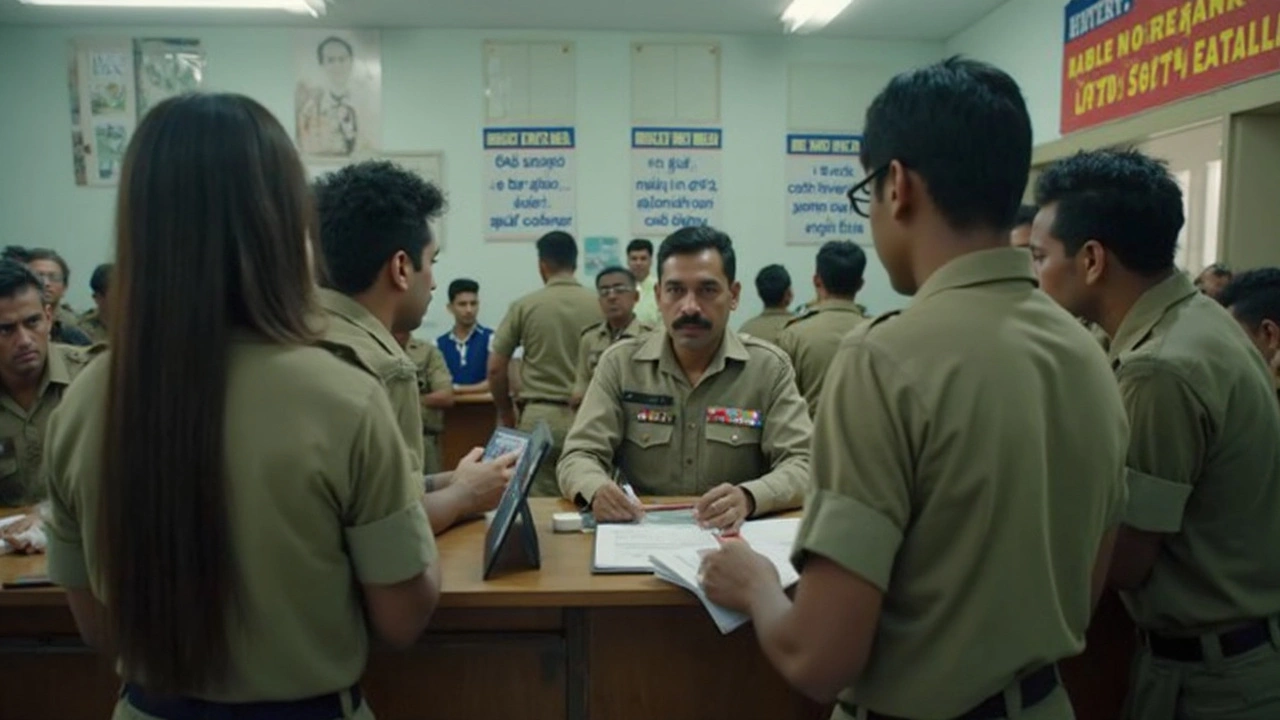Ever wondered if a felony record slams the door on a military career? You’re definitely not the only one. With tough background checks and strict standards, the answer isn’t as simple as you might think.
Here’s the straight truth: having a felony doesn’t automatically equal a hard ‘no,’ but it does make things a whole lot tougher. The military’s main concern is trust and reliability—they want people they can count on, especially in high-pressure situations. That’s why every branch, from the Army to the Air Force, digs deep into background checks when someone enlists.
Some folks believe the military lets felons in as a way to give them a “fresh start.” While that’s happened for certain people, it’s definitely not the norm. Most branches are much pickier than they used to be. Still, there’s a process called a “moral waiver” that offers a sliver of hope if your record isn’t squeaky clean.
If you’re reading this, you probably want straight answers about what’s possible—and what’s not. Whether you’ve just finished probation or your conviction is years in the past, there are some routes worth exploring. Don’t get discouraged yet; the path is tricky, but it isn’t always closed.
- Felony Convictions and Military Rules
- What Crimes Are Deal Breakers?
- The Waiver Process: Hope or Hurdle
- How Recruiters Really Decide
- Other Government Careers for Felons
- Tips to Improve Your Odds
Felony Convictions and Military Rules
If you’ve got a felony on your record, here’s how the military eligibility rules actually work. Every branch—the Army, Navy, Marines, Air Force, Space Force, even the Coast Guard—runs a tight background check as soon as you apply. They’re mostly checking for crimes that question your honesty or reliability. And yeah, felonies go right to the top of that list.
Federal law (specifically, 10 U.S. Code § 504) says anyone convicted of a felony is "not eligible for enlistment" unless the Secretary of the branch gives an official nod. In plain English: by default, you can’t enlist with a felony, but there might be exceptions if higher-ups approve. Each branch has its own policies and will look at your case a little differently. The Air Force and Coast Guard are more strict, while the Army sometimes offers more wiggle room.
Most recruiters are quick to point out that the type of crime, how long ago it happened, and how your life has changed since all play a role. Violent felonies, sex offenses, or drug trafficking? It's almost always a deal breaker. Nonviolent felonies, especially from your teenage years, could get a review. But don’t expect any branch to wave you in just because you ask—it’s a long shot.
Here’s a breakdown of what the branches usually look for:
- Was the felony violent or nonviolent?
- How recent was the conviction?
- Was it a single mistake or part of a pattern?
- Have you shown real change or rehabilitation?
- Are you on probation or parole right now? (If yes, stop here—you can’t join while under supervision.)
Quick fact: According to the Department of Defense, less than 1% of new recruits ever get waivers for felony convictions. Most of those who do had nonviolent offenses and showed years of clean behavior after.
| Branch | Felony Waiver Policy | Strictness |
|---|---|---|
| Army | Allows some felony waivers, case-by-case | Medium |
| Navy | Very selective, rare exceptions | High |
| Marines | Very tough, only minor felonies | High |
| Air Force | Small chance, only for old or lesser felonies | Very High |
| Coast Guard | Almost never grants waivers | Very High |
Bottom line: Every criminal record is different. Your story, your crime, and your efforts to change all get factored in. Getting in with a felony isn’t impossible, but most applicants never make it past the first background check. If you’re serious, you’ll need to gather up every document, reference, and proof of rehab you’ve got to even get a shot.
What Crimes Are Deal Breakers?
If you’ve got a felony on your record, you’re probably wondering which crimes make the military slam the brakes, no matter what. Here’s the deal: the military splits offenses into a few levels. Some are basically automatic disqualifiers—trying to get a military eligibility waiver for these is pretty much a dead end.
Serious or violent felonies top the denied list. If your conviction involved murder, manslaughter, rape, arson, kidnapping, human trafficking, or sexual assault, every branch will turn you down, period. There’s not a single waiver for those. Same goes for crimes against children.
On the other hand, there are felonies that aren’t totally hopeless—like non-violent theft, certain drug convictions (especially if they’re old and not super serious), or minor fraud cases. Sometimes the context and time since conviction can help your case, but don’t count on it as a sure thing.
If your offense involved selling drugs, grand theft auto, weapons charges, or anything tied to organized crime or terrorism, you’re basically out. The military can’t risk giving someone access to sensitive info or weapons if their record shows that kinda stuff.
Here’s a look at the most common crimes that usually kill your military eligibility right away:
- Murder or attempted murder
- Sexual assault or rape
- Kidnapping
- Human trafficking
- Child abuse or exploitation
- Arson
- Robbery with a weapon
- Major drug trafficking
- Treason or terrorism
Stats from the last five years show the military denied over 90% of applications with these crimes listed, even when applicants pushed hard for waivers. Even lower-level felonies can take you out of the running if they’re recent or part of a pattern.
Every case is different, though. Recruiters will look at your full story—what happened, how long ago, and what you’ve done since then. But if your crime’s on this list, it’s best to start looking at other government jobs instead of military service. Up next, let’s talk about that waiver process and how it works for everyone else.
The Waiver Process: Hope or Hurdle
The "moral waiver" isn’t just some paperwork you file and forget. If you have a felony on your record and still want to join the military, this waiver is basically your only shot. But it’s not a magic fix and honestly, not everyone gets through. The process is picky and can stretch on for months.
So, how does it work? Once you tell your recruiter about a past conviction, they need details—court documents, proof you completed probation or parole, and sometimes even personal letters vouching for your character. If you leave out info and get caught, that’s pretty much game over. Be up front from the start, because recruiters check everything.
- The waiver decision goes way up the chain; local recruiters can’t approve it themselves.
- You’ll probably need letters from people in your community (like teachers, bosses, or religious leaders) saying you’ve turned things around.
- The process looks at what kind of felony you have, how old you were, and what you’re doing with your life now. Crimes involving drugs, violence, or sex offenses are nearly impossible to clear with a waiver.
Here’s a tough number to swallow: In recent years, less than 10% of all waiver requests for serious criminal records made it through, according to data released by the Department of Defense. Recruiters want proof you’re serious about a new start—not just looking for an easy ticket.
Also, the branch you apply to matters. The Army has a reputation for being the most open to “second chances,” while the Air Force and Coast Guard are usually stricter about who they’ll consider. Even then, the U.S. military as a whole has tightened up a lot since the early 2000s, especially as the number of people trying to enlist goes up.
Bottom line: The waiver process is tough. It’s slow, detailed, and always a long shot—but if you show real change and keep your paperwork spotless, there’s at least a shot. Don’t fake or hide anything, and keep your expectations real. Talk it through with a recruiter and see if they think you’ve got a chance. That’s the first real step.

How Recruiters Really Decide
Military recruiters deal with people from all walks of life, so they see plenty of folks with bumpy backgrounds. But when it comes to letting someone with a felon tag move forward, it’s way more than just ticking boxes on a form.
First, recruiters have to follow the rules set by each branch. Some are a little stricter than others, but here’s what they all look for:
- Type of Felony: Violent crimes, sex offenses, and drug trafficking almost always mean instant disqualification. Lesser offenses might have a shot at a waiver.
- How Much Time Has Passed: The longer it’s been since the conviction—and the cleaner your record since—the better your odds. Still, most branches want at least two years to have passed after the sentence, probation, or parole ends.
- Pattern of Behavior: Recruiters are on the hunt for people who have genuinely changed. If your record is a one-time thing and you’ve been straight ever since, that works in your favor.
- Current Life Circumstances: They’ll look at your work history, community involvement, and references. Having a steady job or volunteer experience helps show you’re serious about turning things around.
- Waiver Package Strength: The more proof you have—letters from employers, teachers, or even law enforcement—the stronger your case for a waiver.
Here’s a real eye-opener: in 2023, the U.S. Army granted waivers for less than 1% of applicants with felony convictions. It’s not impossible, but the odds aren’t great.
| Branch | Felony Waiver Approval Rate (2023) |
|---|---|
| Army | 0.85% |
| Marine Corps | 0.60% |
| Navy | 0.39% |
| Air Force | Rare/Case-by-case |
One more thing: recruiters have some power, but not the final say. They can help build your case and point you in the right direction, but everything goes up the chain for higher-ups to give the stamp of approval.
To boost your shot, go in with everything ready—court documents, reference letters, and a clear story about how you’ve changed. Don’t try to hide anything; they will find out. Being upfront is key, and sometimes, a recruiter will go the extra mile for someone who’s honest and shows real effort.
Other Government Careers for Felons
If you hit a wall with the military because of a felony, don’t throw in the towel on government jobs just yet. There are roles out there that still consider candidates with a record—just not usually the ones where security clearance or handling firearms is required.
Let’s be real: a criminal record can narrow your job options, but government employers aren’t always as strict as the military. Jobs like city maintenance, sanitation worker, transit operator, or some admin positions in public agencies are often open to people with past felonies—especially if the crime isn’t related to the job itself.
Certain states and cities even have policies that ban asking about conviction history on initial job applications for government roles. These “Ban the Box” laws level the playing field, at least at the interview stage. Right now, more than 35 states in the U.S. have some form of this law for public sector jobs, which can be a pretty big deal if you’re trying to get your foot in the door.
- Sanitation work: Garbage collection and recycling departments in many cities hire ex-felons, especially if you have a good driving record.
- Public transit: Maintenance, cleaning, and sometimes even driving jobs are open if your offense didn’t involve vehicles or violence.
- Public works: Construction, street repair, and landscaping roles usually look at work ethic and experience more than past mistakes.
There are also programs aimed specifically at helping felons land jobs, like Second Chance hiring initiatives. Don’t overlook state workforce agencies—they often know which government jobs regularly consider applicants with past felonies.
| Role | Felon-Friendly? | Notes |
|---|---|---|
| Sanitation Worker | Often | No driving or theft convictions preferred |
| Transit Maintenance | Sometimes | Depends on offense details |
| Administrative Clerk | Sometimes | Background check varies by department |
| Public Parks Groundskeeper | Often | Non-violent felonies have a decent shot |
One thing to keep in mind: some government jobs will consider how long ago your conviction was, your parole status, and whether the crime is related to the work. That’s why it helps to be upfront, polished on your interview skills, and ready with solid references or proof that you’ve turned things around.
If you want a federal government job with a criminal record, those are a bit trickier, but not impossible. Agencies like the U.S. Postal Service and some labor or warehouse positions have hired people with old felonies, if the crime isn’t a direct conflict with job duties. Skip applying for jobs with required security clearances, at least until you clear your record.
Tips to Improve Your Odds
Trying to join the military with a felon label isn’t easy, but there are some practical ways to put your best foot forward. If you’re set on this path, here’s what can lift your chances—no sugarcoating.
- Be Totally Upfront: Lying or hiding any part of your record will usually get you cut from the process fast. Military background checks are intense, and officers find out everything—often with fingerprint checks and court records.
- Gather All Documents: Have certified court records, completion of probation/parole letters, reference letters, and everything else tied to your criminal record ready. Showing proof you’ve met legal obligations is a big deal in the waiver process.
- Keep It Clean: Stay arrest-free as long as possible. Most branches look at how much time has passed since the last conviction. A good stretch—at least three to five years—with no problems on your record looks way better.
- Show Good Character: Recruiters and waiver reviewers want proof you’ve changed. This means consistent work history, positive references (teachers, bosses, community leaders), and maybe even community service.
- Ace the ASVAB: The Armed Services Vocational Aptitude Battery (ASVAB) is a must. A high score helps your case, especially if you’re up against others without a criminal record. Sometimes, showing you’d be an asset makes a big difference.
- Stay Physically Fit: Passing the medical and fitness exams isn’t optional. You need to prove you’re up for the job, which means hitting those physical benchmarks just like everyone else.
- Get Letters of Recommendation: Positive reviews from trustworthy adults you’ve worked with can tip the scales. Judges, school officials, or past employers who can vouch for your growth and reliability make great references.
If you want to see the bigger picture, check out some numbers:
| Branch | Felony Waivers Granted (2023) | Total Applicants (2023) |
|---|---|---|
| Army | 274 | 41,000 |
| Navy | 62 | 23,500 |
| Air Force | 14 | 26,100 |
| Marines | 47 | 28,250 |
So, yeah—getting in with a felony isn’t impossible, but it’s rare. The truth? Every point you earn in your favor counts double if you’re up against a criminal record. Come prepared, stay honest, and show all the ways you’ve left the past behind.



